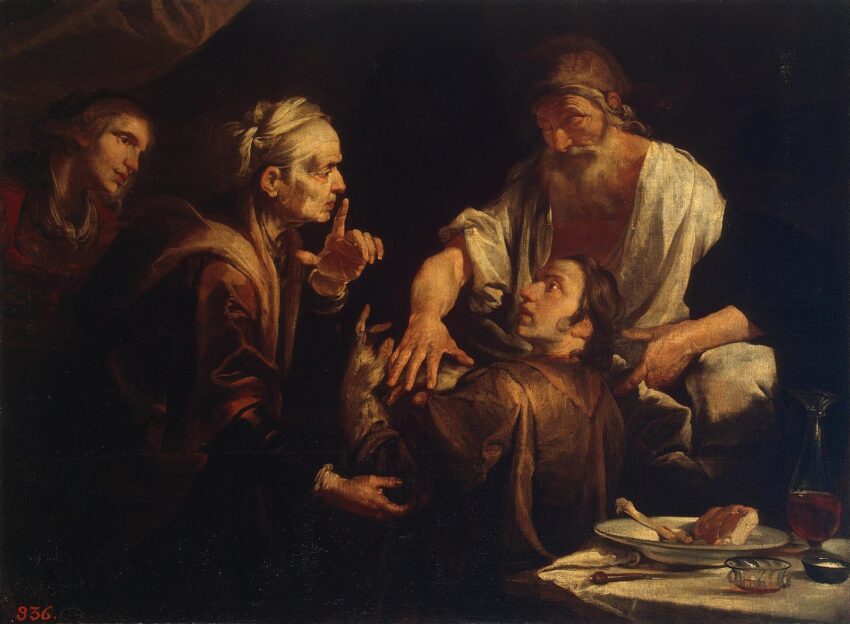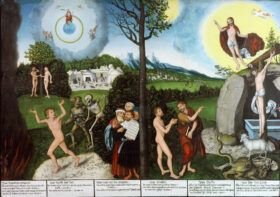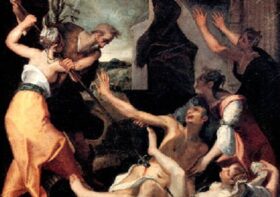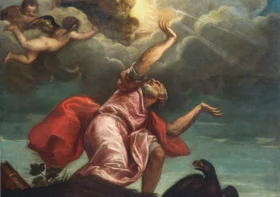Flesh and Promise

Isacc Blessing Esau (1640) by Gioachino Assereto
Toledot (“Generations”) Genesis 25:19-28:9
The parasha for this week is entitled Tol’dot, which means “generations” and takes us from Genesis 25:19 to 28:9. In a way, this modest passage demonstrates the gospel story in full. It does so by highlighting the difference between flesh and Promise.
The text starts off with the Isacc praying to the Lord, beseeching Him to provide a child for his barren wife, Rebekah. The Lord answers his prayerful faith abundantly with not one child, but twins! Inside the womb, these two brothers start fighting with one another, which prompts Rebekah to inquire of the Lord. He answers her with a promise: Two nations are in your womb, and two peoples will be separated from your body; and one people shall be stronger than the other, and the older shall serve the younger.”
As it happens, the older was Esau, and the younger Jacob. Esau was born red and hairy, and he would grow up into an adept hunter. Jacob, on the other hand, came out grasping the heel of his brother and grew into a quiet, tent-dwelling man.
The narrative of Jacob and Esau is interrupted in chapter 26 with the story of a famine that fell on the land. Isaac was forced to uproot his family in search of food. Only, God instructed him not to go to Egypt. Instead, he traveled to Gerar, a Philistine territory where the Lord promised to bless him and his offspring on account of Abraham’s faithful obedience.
Unfortunately, Isaac started his new life in Gerar off on the wrong foot. In true Abrahamic style, he told the inhabitants there that Rebekah was his sister for fear that they would kill him for her. The charade didn’t last very long, though. After finding Isacc and Rebekah being friendly with each other, Abimelech (King of the Philistines) reprimanded Isacc and warned all his subjects to keep their hands off Isaac and Rebekah.
Not long after settling in, Isaac’s prosperity in the land engender envy and fear in the Philistines, prompting Abimelech to kick them out of his city. Isaac and his family moved to a valley outside Gerar, but Philistine animosity followed them there as well. Isaac dug three wells, only one of which the Philistines didn’t confiscate.
Isaac eventually returned to Canaan. There, in the city of Beersheva, he became so fruitful that Abimelech sought him out to make a peace treaty. This Isaac gladly did, showing that Adonai is not only a God of generosity but also a God of peace.
In chapter 27, the storyline returns to Jacob and Esau. By this time, Isaac is old and blind. Aware of his advancing age, he instructs Esau to prepare a meal for him so that he might bless him before he dies. While Esau is out hunting, Rebekah betrays her husband by instructing Jacob on how to steal his brother’s blessing. Rebekah prepares the counterfeit meal and dresses Jacob in donkey hide and Esau’s clothes. This get-up was convincing enough to fool Isaac into bestowing the blessing on Jacob. By the time Esau returned, there was no blessing left to give, sending Esau into a murderous rage. But, Rebekah, it seems, had planned for this contingency. She told Jacob to flee to Haran where he could stay with her brother until Esau’s anger passed.
Thus, Esau is left with his wives and his misery in Beersheba. Only, his wives had become something of miseries themselves. They were foreign women who distressed Isaac and Rebekah for years, placing significant strain on the family unit. Esau attempts to remedy this by marrying again, this time to a Canaanite woman. In fact, he marries a descendent of his uncle Ishmael’s family.
And this is where the story ends, with a fractured family, a disordered home, and a dying patriarch.
But there is hope in this apparently desperate situation! It would be a mistake to judge this situation according to the flesh and not according to the promise. What the flesh sees is that the younger, weaker brother lies his way into a great blessing. But, according to the promise of God’s word, the younger was predestined to rule over the older. In short, the Spirit is in control of history, not the fleshly powers of this world.
Israel was specifically chosen as God’s holy people because of her apparent weakness. The True Church has always been a persecuted minority.
Even our savior, Jesus Christ, condescended to us by taking on the frailty of human flesh. By all fleshly appearances, Christ was defeated on the cross, but according to the Promise, God was displaying his power and victory in the greatest way possible on that cross.
In like fashion we, too, should boast in our weakness and persecution, God’s greatness is amplified in it.
I will leave you with these words from St. Paul in 2 Corinthians 12:9-10: “Therefore I will boast all the more gladly of my weaknesses, so that the power of Christ may rest upon me. For the sake of Christ, then, I am content with weaknesses, insults, hardships, persecutions, and calamities. For when I am weak, then I am strong.”




Leave a Reply